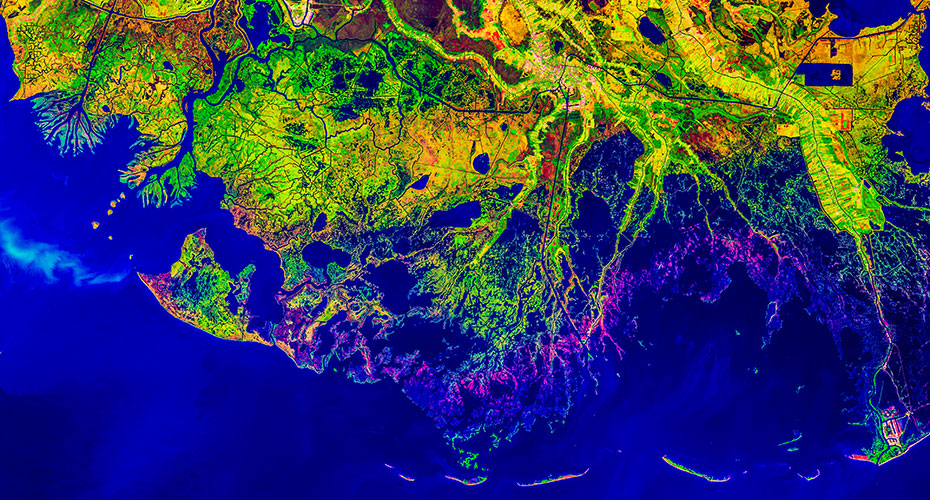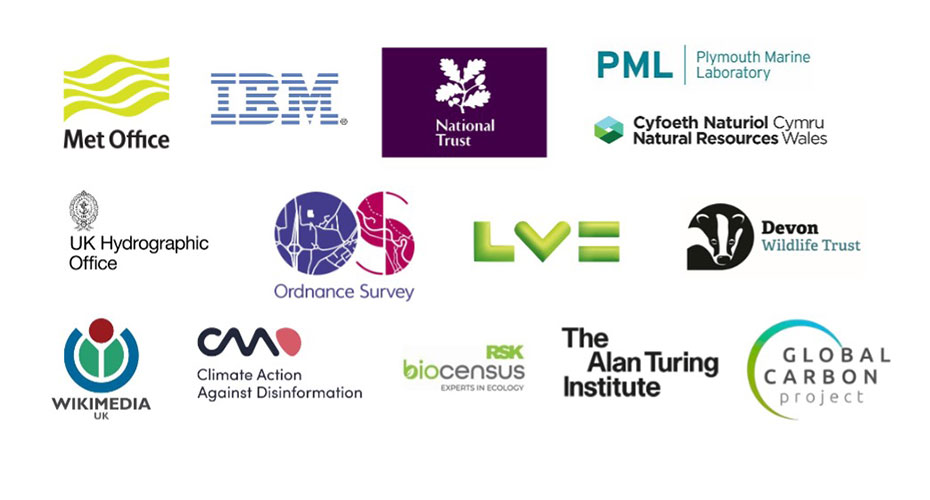Work with us
Enhance your Environmental Intelligence
Environmental Intelligence has a critical role to play in addressing the grand challenges of the climate and biodiversity emergencies, towards achieving the UN’s Sustainable Development Goals and the transformation to a more sustainable society.
EI has the potential to make a vital contribution across a range of policy and application areas from net-zero and climate resilience to food systems-security and clean energy, and from nature recovery and future cities to transportation and public health.
Partnering with us
Through the Centre for Environmental Intelligence, we work with businesses, government, charities, research organisations and public sector bodies across disciplines and sectors, from tech, insurance and finance to conservation, infrastructure and agriculture, in the UK and beyond, to tackle urgent environmental and sustainability challenges through the application of data science and AI.
Focussing on applied, translational EI research and innovation, to deliver real-world impacts, from informing decision making and influencing policy and practice to risk assessment and management, and development and evaluation of novel technological solutions.
Ways of working
We can work with organisations in a variety of different ways as best suits your interests, needs, timescales and resources, including:
Contact us
Projects

Partnership with the National Trust, landowners, businesses, and communities, utilising EI driven decision-support tools, to reshape understanding and action on biodiversity and restore woodlands, wetlands and farmland across the UK.
Environmental Intelligence theme Lead: Professor Peter Challenor
Partner: National Trust
Find out more

A pioneering AI research project to develop user-bespoke digital twins and co-created AI-enhanced decision support tools to aid crucial decisions about land use changes, focussing on creation of new woodlands and forests.
Academic Lead: Professor Danny Williamson
Partners: Defra, MoD, National Trust, Network Rail, Forestry England, National Forest Company and the Woodland Trust
Find out more

Research project utilising Computer Vision and CCTV to automatically identify when sluice gates in local rivers have become blocked with rubbish and to classify the nature of such blockages. This approach supports decision-making around the deployment of maintenance teams, saving time and improving river quality, whilst also supporting flood prediction and prevention.
Academic Leads: Professor Hywel Williams, Dr Remy Vandaele
Partner: Staffordshire County Council
Find out more

Teaming up with Plymouth Marine Laboratory and IBM, scientists at the Centre for Environmental Intelligence are gathering and utilising local data on phtyo plankton and carbon in the ocean to improve train and improve geospatial foundation models. This work will create a key capability for more accurate carbon and climate modelling.
Academic Leads: Professor Chunbo Luo, Professor Hywel Williams, Dr Remy Vandaele
Partners: Plymouth Marine Laboratory, IBM
Find out more

Natural England monitor and classify habitats, for instance as ‘Coniferous Woodland’, ‘Heathland’ or ‘Lowland Meadow’, as part of their national scale LivingEngland habitat map. Scientists at the Centre for Environmental Intelligence are working with them to develop an application that will use site photos, from field ecologists and potentially citizen scientists, and a checklist to automatically identify and record these, increasing the range of observations and data that can be utilised for habitat mapping.
Academic Lead: Dr Sareh Rowlands
Partner: Natural England
Find out more

We have developed a Chatbot interfacing with the UK Climate Projects (UKCP) data and reports produced by the Met Office, to provide accurate evidence-based answers about climate change to scientists, the general public and journalists. This capability ensures the Met Office can provide 24/7 factual responses drawing on a curated archive of peer reviewed papers. This tool counters misinformation and by drawing on a verified source of information does not struggle with the inaccuracies many untrained chat bots such as Chat GPT are associated with. The Chatbot provides reliable answers in plain English and is easily used by the wider general public including schools.
Academic Lead: Professor Hywel Williams
Partner: Met Office
Find out more

The Earth Rover Program is a non-profit initiative focused on transforming soil assessment by applying seismology—a mature, low-cost technology—for agricultural and scientific benefit. The program uses geophones and seismic wave techniques to “see” into soil structure, moisture, volume, and potentially carbon and nutrient levels—without disturbing the ground.
The program’s goal is to empower farmers—regardless of scale or income—to monitor soil health in real time, boosting crop yields while reducing environmental impact . By generating spatially explicit soil health data and building operational hubs globally, the program aims to support both precision agriculture and soil science, tackling widespread soil degradation and helping secure sustainable food production for a growing global population.
Academic Lead: Professor Tarje Nissen-Meyer
Partner: Bezos Earth Fund
Find out more

The Centre is a five-year £10M initiative funded by UKRI conducting research on climate change and its impacts on health.
Net-positive solutions aim to reduce the negative health impacts of climate mitigation and adaptation, whilst also contributing to positive outcomes – such as ecosystem recovery and improved human wellbeing - whilst ensuring new measures don’t worsen existing inequalities among those communities most impacted by climate change.
Individual projects are focusing on the design of urban environments, green and blue spaces, and food systems, as well as analysing associations between mental health and climate, and specific mechanisms linking thunderstorms and asthma.
Lead Academic: Professor Tim Taylor
Partners: UK Health Security Agency, National Trust, Forest Research, Met Office
Find out more

Through the Centre for Environmental Intelligence the University of Exeter is delivering Foundation and Advanced (Deep Learning) training in Machine Learning to over 150 Met Office staff. These programmes deliver research led education both in online and in person formats to ensure the Met Office remains at the cutting edge of climate research and meteorology.
Lead Academic: Dr Stefan Siegert
Partner: Met Office
Find out more
Our EI partners include


















